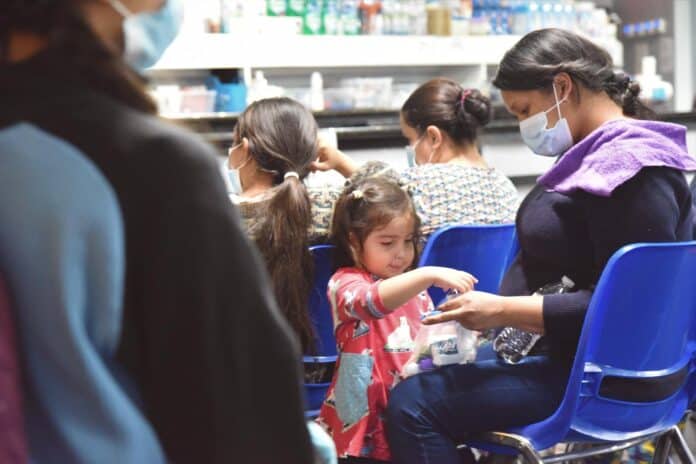Hundreds of migrants in Matamoros waiting to be processed into the U.S. in a few days could join the hundreds stalled in the Rio Grande Valley waiting for buses and planes to resume their journeys.
Most migrant families released from federal custody end up at the Catholic Charities Respite Center in McAllen, which receives about 50 people a day. When the weather grounded flights and bus trips this week, the crowds began accumulating.
“We were at 350,” Sister Norma Pimentel, executive director of the respite center, estimated Wednesday afternoon before receiving a new group from U.S. Border Patrol. “So it’s possible with this group that just arrived that we’ve probably gone up to 375, or 380 or something like that.”
Before the pandemic, they could accommodate 1,200 people at a time. Now, Pimentel tries to keep their capacity close to 600.
About a dozen women sat with their children near the door where a nurse helped address any health concerns. Dozens more sat in chairs facing a wall away from the entrance at the registration center, where they made calls to relatives or friends helping them arrange travel plans.
A long line snaked alongside those waiting to be registered and ended at the dining hall. Power went out at the center, keeping staff from cooking food for the hungry travelers. Pimentel said the local community didn’t let them stay empty-handed.
“Therefore all the food is being brought out by different groups, by parishes and from family restaurants. It’s amazing how much food is coming to us to feed all these families,” Pimentel said.
“Normally, they arrive today; they leave today,” Pimentel said.
Not tonight.
“They’re not leaving. We’re going to have to hold them until the bus routes open up and the planes open up as well. It’s kind of building up the number of people that we have,” she said.
Those numbers will begin rising steadily.
Migrants waiting in Mexico for over a year-and-a-half under the Migrant Protection Protocols — a Trump-era program that forced them to wait on Mexican soil for their U.S. court hearings — will start being reprocessed by the U.S. in the coming days.
A roundtable discussion — moderated by Pimentel and held between Department of Homeland Security Secretary Alejandro Mayorkas and border non-governmental organizations like the Texas Civil Rights Project, Team Brownsville, and the Sidewalk School — shared new details about the upcoming process.
Secretary Mayorkas said DHS collaborated extensively with the Mexican government and international organizations like the United Nations High Commissioner for Refugees to create a system to reprocess people under MPP.
There are over 25,000 people enrolled in the program, with many living throughout different parts of Mexico or back in their home countries. A census that took place at the Matamoros camp over the weekend found there’s about 350 living in the makeshift camp close to the international bridge, according to the Tamaulipas regional immigration official, Enrique Maciel.
Finding and enrolling them into an online platform will involve the help of various NGOs, DHS officials said Wednesday morning.
“We’re relying on them to help us figure out whose cases should go first,” David Shahoulian, DHS Assistant Secretary of Border Security and Immigration, said.
Reprocessing will include those seeking asylum with active cases, which were defined by Shahoulian as, “if there is not a final order of removal, the individual is eligible for Phase 1. So, a case on appeal is not final.”
People with active cases will be enrolled based on how long they’ve been in Mexico.
“It is my understanding that our partnership with the international organizations, that the international organizations will prioritize individuals according to the date on which they enter the MPP program,” Secretary Mayorkas said.
However, exceptions could be made.
“People who are in danger in Mexico, whose child may be in the U.S., for example, or who have medical conditions, those kinds of cases, if you think that somebody just cannot wait, they need to go much more quickly,” Shahoulian said, adding, “that can be expressed to UNHCR for their evaluation and triaging.”
Originally, CBP officials were directed to begin processing Friday at the Brownsville port of entry. Even during the morning roundtable, Secretary Mayorkas was still using Feb. 19 as the starting date.
But by Wednesday evening, Pimentel received an update from DHS.
Processing would begin Monday, Feb. 22, with only 25 people at a time, a reprieve as migrant families prepared to spend the night at the respite center.
When that begins, Pimentel said she and the other shelters in the Valley are ready to help.
“We want to make sure that things are orderly, that things are done right. That it doesn’t become chaotic and out of control,” she said.




